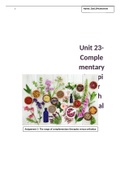1 Name: Zae12Mcmorrow
Unit 23-
Comple
mentary
Therapi
es for
Health
& Social
Care
Assignment 1- The range of complementary therapies versus orthodox
,2
Introduction
Learners will be able to study the use of complementary therapies in health and social care
settings after completing this unit. I'll be able to look at the importance of complementary
therapies in sustaining health and wellbeing, as well as comparing them to conventional
treatments. Also, I'll be able to take a more holistic approach to medicine and healthcare.
Health and social care practitioners must be aware of the spectrum of complementary
therapies available and how they can be utilised to complement conventional and orthodox
treatment. Complementary therapies are growing more popular in the United Kingdom,
with some treatments covered by the National Health Service. The goal of this unit is for
students to gain a better understanding of a variety of alternative therapies and their
position in relation to conventional medicine. I'll then go over the advantages of
complementary therapies for health and well-being, as well as any contraindications and
any health and safety concerns. The effectiveness of different therapies and their
practitioners being regulated will be explored.
Complementary Therapies
Complementary therapies differ from traditional or mainstream medicine in that they take a
different approach. Yoga, meditation, acupuncture, and homoeopathy are examples of
therapies that aren't normally part of mainstream medical care. They're frequently utilised
in conjunction with or in addition to traditional therapy. Conventional medicine is founded
on scientific evidence, which means that treatments and drugs have been thoroughly
examined to see if and how well they work. Evidence-based medicine is the term for this
approach. Your doctor bases his or her treatment decisions on the most up-to-date
research, clinical judgement, and what you think. When you use regulated healthcare
services in the UK, such as your local GP surgery, health centre, or hospital, doctors use this
approach (bupa, 2021).
Alternative Therapies
Alternative medicine refers to medical treatments that are utilised instead of conventional
(mainstream) treatments. It's also known as "integrative" or "complementary" medicine by
others. In the United Kingdom, more than half of respondents claim they utilise
complementary and alternative medicine (webmd, 2021). Acupuncture is one example of
how it can be used to aid with some of the negative effects of cancer treatment. Alternative
medicine is utilised in alternative medicine. One example is the use of a particular diet
instead of cancer drugs prescribed by an oncologist to treat cancer (cancer, 2021).
Orthodox/conventional medicine or treatments
Medical doctors and other healthcare professionals (such as nurses, pharmacists, and
therapists) use medications, radiation, or surgery to treat symptoms and diseases.
Biomedicine, conventional medicine, mainstream medicine, and Western medicine are all
examples of allopathic medicine (cancer, 2021). Massage, herbal remedies, exercise,
lifestyle counselling, meditation, relaxation, acupuncture, and art therapy are all examples,
in addition to homoeopathy (bioethics, 2021).
, 3
M1- Discuss complementary therapies that are available for users of health and social care
services.
In this task, I’ll be discussing five complementary therapies that are available for users of
health and social care services.
Acupuncture
Acupuncture is a traditional Chinese medicine healing technique in which fine needles are
inserted into particular spots on the body. It's mostly used to cure pain, but it's also been
used to treat other conditions. Acupuncture is used by more than 3 million individuals in the
United Kingdom, but it is considerably more prevalent in other nations. One in every five
people in France, for example, has tried acupuncture. Acupuncture works by stimulating
points along 14 energy pathways to let the body's vital energy, or "chi," flow freely. Some
researchers believe that the needles induce the body to release endorphins, which are
natural painkillers, as well as increasing blood flow and altering brain activity. Acupuncture,
according to critics, only works because patients believe it will, a phenomenon known as the
placebo effect (wedmd, 2021).
Acupuncture needles are extremely small, and most patients experience no or minimal pain
when they are put. After the therapy, patients frequently report feeling energetic or calm.
The needles, on the other hand, can cause momentary soreness. When combined with pain
medication or another therapy, such as massage, acupuncture may provide further pain
relief. Acupuncture may help some persons with chronic pain reduce their drug use and
enhance their quality of life. Acupuncture is occasionally used to assist people cope with
cancer or chemotherapy symptoms by reducing pain, nausea, and vomiting. It can also assist
with the hot flashes that occur with breast cancer (wedmd, 2021).
Acupuncture is a viable alternative to pain
drugs and steroid therapies because it rarely
causes more than minor adverse effects. It
can also be used in conjunction with other
treatments as a "complementary" medicine.
It's essential to talk to your doctor about
whether or not you should use acupuncture.
Acupuncture is generally safe, and significant
side effects are uncommon, although there
are certain risks. Infection might occur if the
needles are not sterile. Make sure your doctor uses sterile needles that are discarded after
each usage. Needles put too deeply in some acupuncture points can penetrate the lungs or
gallbladder, or create blood vessel problems. That is why it is critical to get treatment from
an acupuncture specialist (wedmd, 2021).
Bleeding is more likely among those who have bleeding disorders or who take blood
thinners. For persons who have pacemakers or other electrical devices, electrical
stimulation of the needles can cause complications. Before getting acupuncture, pregnant
women should consult with their doctor. It's crucial not to forego traditional medical





